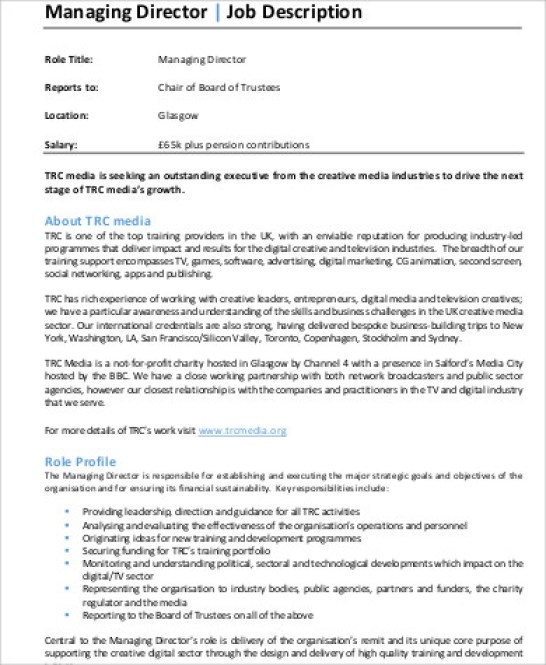7 Key Marketing Director Duties & Responsibilities Explained

In the fast-paced world of business, the role of a Marketing Director is both critical and multifaceted. This executive position demands a unique blend of strategic vision, creative thinking, and operational prowess. Marketing Directors are the architects behind a company’s brand identity, market positioning, and customer engagement strategies. Let’s delve into the core duties and responsibilities that define this pivotal role, shedding light on the intricacies of steering a brand towards success in a competitive marketplace.
1. Strategic Planning and Visionary Leadership

At the heart of a Marketing Director’s role lies the responsibility of crafting and executing comprehensive marketing strategies. This entails a deep dive into market analysis, identifying trends, understanding customer behaviors, and pinpointing gaps in the market that the brand can exploit. The Marketing Director must translate these insights into a cohesive marketing plan that aligns with the company’s overall business objectives. This strategic blueprint not only outlines the direction for the marketing team but also ensures that every campaign, initiative, and tactic contributes to the broader goals of the organization.
A Marketing Director's ability to foresee market shifts and adapt strategies accordingly can be the difference between a brand that leads and one that follows. It's about creating a vision that resonates with both the internal team and the external market.
2. Brand Development and Management

The brand is the face of the company, and the Marketing Director is its custodian. This responsibility encompasses not just the visual elements like logos and color schemes but also the brand’s voice, values, and promise to its customers. The Marketing Director ensures consistency across all platforms and touchpoints, from digital media to physical packaging. They also oversee the evolution of the brand, making strategic decisions on when and how to refresh the brand identity to stay relevant and engaging.
Effective brand management involves a delicate balance between maintaining brand heritage and innovating to meet changing consumer expectations.
3. Market Research and Consumer Insights
Informed decision-making is the cornerstone of successful marketing, and this is where market research comes into play. Marketing Directors are tasked with designing and implementing research initiatives to gather actionable insights about target audiences, competitors, and industry trends. This involves both qualitative and quantitative methods, from surveys and focus groups to data analytics and social media listening. The insights gleaned from these efforts inform every aspect of the marketing strategy, from product development to campaign messaging.
"Understanding the customer is not just about demographics; it's about psychographics - what drives their decisions, their pain points, and their aspirations."
4. Campaign Development and Execution
Bringing the marketing strategy to life is where the rubber meets the road. Marketing Directors lead the charge in conceptualizing and executing marketing campaigns that capture attention, engage audiences, and drive conversions. This involves collaborating with creative teams, digital marketers, and external agencies to produce compelling content, from video ads and social media posts to email newsletters and influencer partnerships. The director ensures that each campaign is not only creative and engaging but also aligned with the brand’s messaging and strategic goals.
- Conceptualization: Brainstorming and ideation sessions to develop campaign themes and messages.
- Planning: Detailed campaign plans including timelines, budgets, and resource allocation.
- Execution: Overseeing the production and launch of campaign materials across various channels.
- Monitoring: Real-time tracking of campaign performance and making adjustments as needed.
- Analysis: Post-campaign evaluation to assess ROI and gather learnings for future campaigns.
5. Team Leadership and Development

A Marketing Director is only as strong as their team. Leading a diverse group of professionals, from content creators and graphic designers to SEO specialists and data analysts, requires not just managerial skills but also the ability to inspire and mentor. The director is responsible for recruiting top talent, fostering a collaborative and innovative work environment, and providing ongoing training and development opportunities. They also play a crucial role in setting team goals, managing performance, and ensuring that every team member is aligned with the company’s vision and values.
| Pros of Effective Team Leadership | Cons of Poor Leadership |
|---|---|
| Higher employee engagement and satisfaction | Low morale and high turnover rates |
| Increased creativity and innovation | Stagnation and lack of new ideas |
| Stronger team cohesion and collaboration | Siloed departments and communication breakdowns |

6. Budget Management and Financial Oversight
Financial acumen is a critical skill for Marketing Directors, who are entrusted with managing substantial budgets to fund marketing activities. This involves not just allocating resources effectively but also ensuring that every dollar spent contributes to measurable business outcomes. The director must work closely with finance teams to forecast expenses, track spending, and report on the ROI of marketing investments. They are also responsible for negotiating contracts with vendors, agencies, and media partners to maximize value and minimize costs.
In an era of tight margins and heightened scrutiny, the ability to demonstrate the financial impact of marketing efforts is more important than ever. Marketing Directors must be adept at linking marketing spend to tangible business results.
7. Performance Measurement and Optimization
The proof of the pudding is in the eating, and for Marketing Directors, this means rigorously measuring the effectiveness of marketing initiatives. Utilizing a range of analytics tools and KPIs, they assess the performance of campaigns, channels, and tactics to identify what’s working and what’s not. This data-driven approach enables continuous optimization, ensuring that marketing efforts are always evolving to deliver better results. The director also plays a key role in communicating these insights to stakeholders, from the executive team to the board, to build support for future marketing initiatives.
"In marketing, what gets measured gets managed. The ability to track, analyze, and act on performance data is what separates good marketing from great marketing."
How does a Marketing Director contribute to product development?
+Marketing Directors play a pivotal role in product development by providing market insights, consumer feedback, and competitive analysis that inform product features, pricing, and positioning. They ensure that new products align with market demands and brand strategy.
What skills are essential for a Marketing Director?
+Essential skills include strategic thinking, creative problem-solving, leadership, financial management, and a deep understanding of digital marketing and analytics. Strong communication and interpersonal skills are also crucial for collaboration and stakeholder engagement.
div>How do Marketing Directors stay ahead of industry trends?
+Staying ahead requires a commitment to lifelong learning, including attending industry conferences, participating in webinars, reading relevant publications, and networking with peers. Many directors also leverage data analytics tools to spot emerging trends early.
What is the role of a Marketing Director in crisis management?
+During a crisis, the Marketing Director is key in crafting and communicating the company's response, ensuring that messaging is consistent, empathetic, and aligned with the brand's values. They also monitor public sentiment and adjust strategies as needed to protect the brand's reputation.
How do Marketing Directors measure the success of a campaign?
+Success is measured through a combination of KPIs tailored to the campaign's objectives, such as engagement rates, conversion rates, ROI, and customer acquisition costs. Advanced analytics tools help in tracking these metrics in real-time and post-campaign.
In conclusion, the role of a Marketing Director is as challenging as it is rewarding, requiring a unique blend of strategic insight, creative flair, and operational excellence. By mastering these key duties and responsibilities, Marketing Directors can drive their brands to new heights, capturing the hearts and minds of consumers in an increasingly crowded marketplace. The journey is complex, but with the right approach, the possibilities are limitless.
